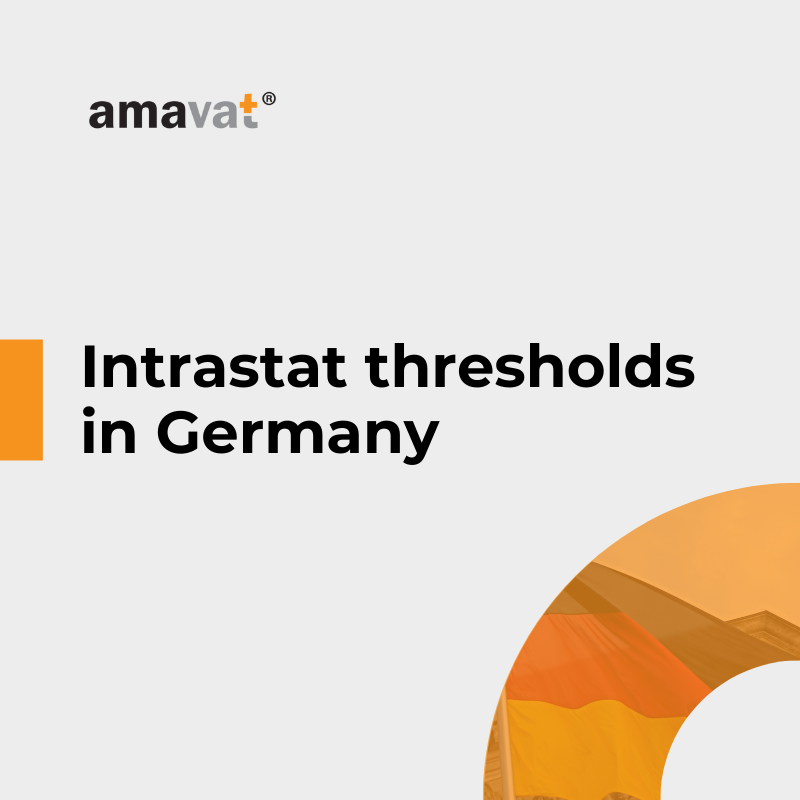Intrastat thresholds in Germany: Requirements and procedures for e-commerce

Spis treści
Intrastat Germany – Basic and detailed thresholds
There are two statistical thresholds for Intrastat in Germany – basic and detailed. The difference between them lies in the scope of data required to submit the declaration. Exceeding the basic threshold requires submitting a declaration with fewer data than exceeding the detailed threshold.
Entities whose turnover falls between the basic and detailed thresholds are exempt from filling in some fields on the report. However, the declaration itself consists of 22 fields, of which 18 must be completed at the basic thresholds and all at the detailed thresholds.
The obligation to report Intrastat arises when the value of imports or exports of goods exceeds the established thresholds for a given reporting year or the previous year. This means there is a duty to monitor the turnover of two consecutive years – the current and the previous one.
Intrastat thresholds applicable in Germany:
- The basic threshold value for imports is EUR 3 000 000.
- The basic threshold value for exports is EUR 1 000 000.
INTRASTAT rates applicable in other EU countries can be found on our website: Current Intrastat thresholds and VAT rates in Europe.
Intrastat declarations in Germany – Deadline and submission method, zero declaration, and penalties
The Intrastat declaration is a key document collecting essential statistical data related to international trade. Its purpose is to enable the analysis of goods movements within the EU and assist in formulating economic and trade strategies.
In Germany, Intrastat declarations are submitted to the Federal Statistical Office. The deadline for submitting declarations is the 10th working day of the month following the reporting period.
Intrastat declarations can be submitted electronically using accepted formats such as IDEV or eSTATISTIK.core. There is also the option to submit declarations in paper form if electronic submission is not possible. In case of errors in the declaration, it is necessary to submit a corrective declaration for which there are specified criteria regarding changes in statistical value, net mass, and other declaration fields.
A zero declaration is required when a business is obliged to submit monthly Intrastat declarations but has made no intra-Community supplies or acquisitions of goods in a given month. It is a form of confirming the absence of commercial activity during that period.
Failure to submit the declaration on time may result in penalties for the entrepreneur. The penalty for not submitting an Intrastat declaration in Germany can be up to EUR 50,000. Therefore, it is important to strictly adhere to the deadlines for submitting declarations as well as their completeness and correctness to avoid negative financial consequences.
VAT rates in Germany
In Germany, there are three main VAT rates, which vary depending on the type of goods and services. The standard rate is 19% and applies to most products and services. There is also a reduced rate of 7%, which applies to selected food items, medical services, short-term accommodation, and cultural events. Additionally, there is a 0% rate, which is applied to intra-Community and international transport, except for certain types of road, rail, and inland waterway transport.
More detailed information on this topic can be found here: Germany VAT – The Rates & Registration.
VAT registration in Germany
The obligation to register for VAT in Germany for foreign entities arises from the need to account for German VAT. This is required if a business, among other things, stores and dispatches its goods from the territory of Germany. Additionally, exceeding a revenue of EUR 10,000 from distance selling to customers in the European Union also obliges to account for German VAT in this country or within the VAT-OSS system. VAT registration in Germany thus becomes a necessary step for foreign entities conducting commercial activities in Germany to meet legal requirements and avoid potential tax consequences.
You can learn more about VAT registration in Germany from our article: https://amavat.eu/vat-registration-in-germany-for-the-e-commerce-sector-key-information-and-important-changes-for-2024/.
Summary
Understanding the regulations regarding Intrastat in Germany is crucial for e-commerce entrepreneurs conducting business with this country. Strict adherence to thresholds, declaration deadlines, and proper completion of documents can help avoid penalties and other consequences of failing to fulfill obligations. Therefore, it is worth staying regularly informed about current regulations and adjusting your business to the requirements of the Intrastat system in Germany: Contact us – amavat ®.





